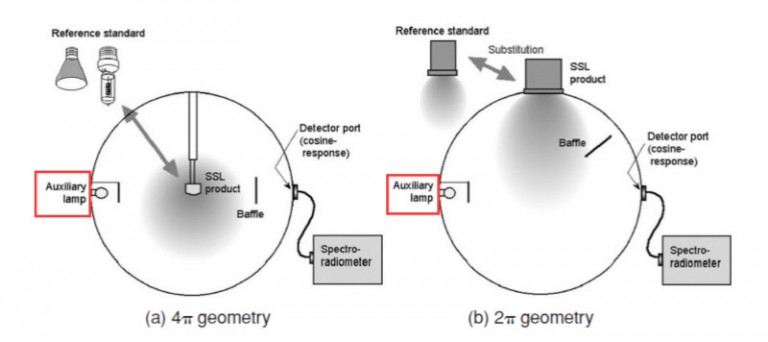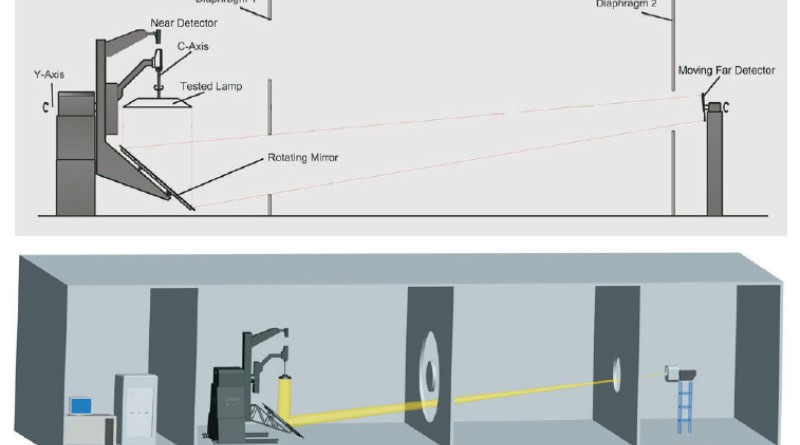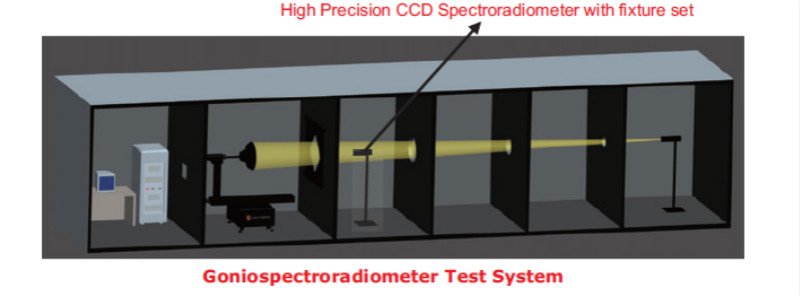According to the requirements of the LM-79 optical testing standards applicable to the widest range in the world, although there are many photometric measurements for light sources and lamps are available, but these standards are dedicated to the measurements for light sources and lamps. Because the form of current SSL products are lamps or luminaires, and LED in the luminaires is not easy to be replaced or separated, the existing standards cannot be directly applicable to SSL products, which requires the use of absolute photometry measurements. The photometric information required for SSL products is usually the total luminous flux (lm), luminous efficiency (lm/W), luminous intensity (Candela) in one or more directions, chromaticity coordinates, correlated color temperature and color rendering index.
There are two kinds of goniophotometry methods in LM-79: integrating sphere + spectroradiometer; goniophotometer. Each of these two test systems has its own advantages and disadvantages. For different SSL (solid state lighting products), users can make their own choice. Two test methods for environmental temperature, air flow, power supply have specific requirements, please refer to the contents of LM-79 2.0~8.0.
For Integrating Sphere System:
Integrating sphere system is suitable for integrating LED lamps and relatively small LED light sources to measure total luminous flux and colorimetric parameters. Integrating sphere system has the advantages of fast measuring speed and no need darkroom.
The air flow inside the sphere can reach the minimum, and the temperature inside the sphere is not easily affected by the potential airflow in the temperature control room. However, the test temperature in the integrating sphere still needs to meet the requirements of temperature in LM-79 2.0~8.0. Lisun recommends using IS-XXMT series constant temperature integrating sphere to control the test temperature to 25°inside the sphere.
There are two use ways of integrating sphere, one is V(λ) corrected photometric detector, and the other is spectrum analyzer. Because the integral sphere photometer has V(λ) spectral response deviation, the first method will produce spectral mismatch error, and the second method has no spectral mismatch error theoretically. So now most of the widest spectrum system use spectroscopy measurement in the market, and Lisun recommends LMS-9000B using spectroscopy with spectrophotometric method modified after years of research and development, and if equipped with IS-XXMT constant temperature integrating sphere, it can guarantee the test precision.
When choosing the size of integrating sphere, it needs to take into account the power and shell size of SSL products. In general, for compact lamps, 1m integrating sphere can be chosen. But if the lamp power is more than 500W, 2m integrating sphere may be suitable.
In the choice of integral ball size, while taking into account the needs of power and shell size of SSL products, usually for compact lamps can choose integral ball 1 meter, and when the lamp power is more than 500W need to consider the use of integral ball 2 meters. At the same time, if using 4π test mode, the surface area of tested lamp needs to be less than 2% of the area of sphere reflective coating, such as for a 2m integrating sphere, it can only be used to test lamps no more than 30CM in length. When testing the lamp tube or the strip lamp, the length of the lamp cannot exceed 2/3 of the diameter of the integrating sphere
There is another very important step in the use of integrating sphere spectroradiometer system, that is, the self absorption correction. The response of the sphere system changes due to the absorption of light by the luminaire inside the sphere, and the error may occur when the size and shape of the light source are not consistent with the standard light source.
Self absorption correction is critical because the physical size and shape of the SSL product are usually different from the size and shape of the standard lamp. If the self absorption correction is not carried out, the lumen test results will be low.

According to the introduction we find that integrating sphere + spectroradiometer test system can carry the test in a very short time, and do not needs the darkroom, through integrating sphere diffuse reflection, the system can test the total luminous flux of lamps in all directions. But they also have some disadvantages: size of test luminaire should be small, the test result is affected by the standard lamp, and the test procedure is complicated (need to use the auxiliary lamp for self absorption correction), also it needs frequent calibration.
LISUN recommends that users use LPCE-2 (LMS-9000) spectroradiometer integrating sphere system for testing light and compact lamps. Also after years of development, LPCE-2 system can carry the test automatically, and all parameters can be read via software. With the standard lamp calibrated by LISUN standard laboratory, the test accuracy can be guaranteed.
For Goniophotometer System:
The most important function of the goniophotometer is to test the intensity distribution and to export the IES/LDT file of SSL products, but the lumen parameters of the measured sample can also be obtained by calculation.According to the requirements of LM-79, only vertical moving mirror moving detector goniophotometer is in compliance with test requirements (e.g. LISUN LSG-6000/3000)

Other types of goniophotometer due to causes a change in the working position of the lamp, generally used in the laboratory is not recommended, but LISUN Rotary Center Goniophotometer LSG-1890B/1800A Series, through the use of high precision constant temperature detector and custom software, can greatly weaken the error.

There are two most obvious advantages of using goniophotometer for photometric measurement:
1.Its test result is absolute value, rather than with the integrating sphere system need contrast conversion by standard lamp. If it is used to test the large lamp, the accuracy will be greatly improved, and there is no need to use additional auxiliary lamp to do self absorption calibration.
2.All optical parameters can be measured by adding spectroradiometer and corresponding detector in the darkroom. And the test data is the parameters of each angle in the space, more convincing.
But in order to realize the multi-function and high-precision measurement, the use of goniophotometer also has many limitations:
1.According to the standard requirements, the distance between the detector and the measured lamp must be at least 5 times of the length of the longest axis of the measured lamp. For the tested lamp with light beam angle, the required length will be longer. For example, if you need to test a 1m lamp, then the length of the darkroom light path needs at least 5 meters, plus the equipment itself rotating and placing position, the overall length of the darkroom needs to reach about 8 meters.
2.Darkroom needs to be brushed using non-reflective black material, any reflective position may have an impact on the test results.
3.It takes longer time (longer testing time than the integrating sphere system) to complete the test.
According to the above description we can see that although the integrating sphere has the advantages of high testing speed, low environmental requirements, but the use of the goniophotometer system, especially goniophotometer system with the photometric detector and spectroradiometer can test all parameters of the SSL products, and also can export the IES/LDT file for the lighting design.
After years of experience and design, LISUN recommends users to test the bulb lamp, T5/T8 lamp, light source, small chip integrated lamps with spectroradiometer + integrating sphere test system (LPCE-2), and to test large lamp, street lamp, HID lamp with goniophotometer system (LSG-6000CCD/LSG-1890BCCD).
Lisun Instruments Limited was found by LISUN GROUP in 2003. LISUN quality system has been strictly certified by ISO9001:2015. As a CIE Membership, LISUN products are designed based on CIE, IEC and other international or national standards. All products passed CE certificate and authenticated by the third party lab.
Our main products are Goniophotometer, Surge Generator, EMC Test Systems, ESD Simulator, EMI Test Receiver, Electrical Safety Tester, Integrating Sphere, Temperature Chamber, Salt Spray Test, Environmental Test Chamber, LED Test Instruments, CFL Test Instruments, Spectroradiometer, Waterproof Test Equipment, Plug and Switch Testing, AC and DC Power Supply.
Please feel free to contact us if you need any support.
Tech Dep: Service@Lisungroup.com, Cell/WhatsApp:+8615317907381
Sales Dep: Sales@Lisungroup.com, Cell/WhatsApp:+8618917996096
Tags:LPCE-2(LMS-9000) , LPCE-3 , LSG-1700 , LSG-1890B , LSG-6000
Your email address will not be published. Required fields are marked *